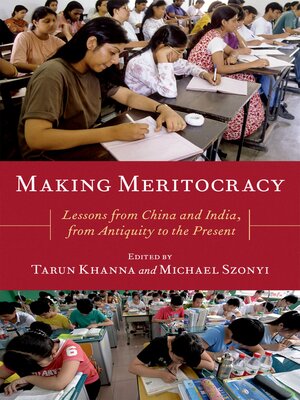Making Meritocracy
ebook ∣ Lessons from China and India, from Antiquity to the Present · Modern South Asia
By Tarun Khanna

Sign up to save your library
With an OverDrive account, you can save your favorite libraries for at-a-glance information about availability. Find out more about OverDrive accounts.
Find this title in Libby, the library reading app by OverDrive.



Search for a digital library with this title
Title found at these libraries:
| Library Name | Distance |
|---|---|
| Loading... |
How do societies identify and promote merit? Enabling all people to fulfill their potential, and ensuring the selection of competent and capable leaders are central challenges for any society. These are not new concerns. Scholars, educators, and political and economic elites in China and India have been pondering them for centuries and continue to do so today, with enormously high stakes. In Making Meritocracy, Tarun Khanna and Michael Szonyi have gathered over a dozen experts from a range of intellectual perspectives—political science, history, philosophy, anthropology, economics, and applied mathematics—to discuss how the two most populous societies in the world have addressed the issue of building meritocracy historically, philosophically, and in practice. They focus on how contemporary policy makers, educators, and private-sector practitioners seek to promote it today. Importantly, they also discuss Singapore, which is home to large Chinese and Indian populations and the most successful meritocracy in recent times. Both China and India look to it for lessons. Though the past, present, and future of meritocracy building in China and India have distinctive local inflections, their attempts to enhance their power, influence, and social well-being by prioritizing merit-based advancement offers rich lessons both for one another and for the rest of the world—including rich countries like the United States, which are currently witnessing broad-based attacks on the very idea of meritocracy.







